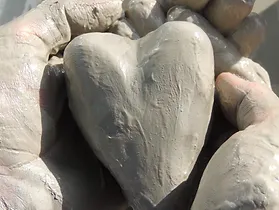
CLAY
Pottery is made from clay which in its raw form is a biodegradable, natural material sourced directly from the earth.
My main supplier of clay and glazes is proud to be B Corp certified (reaching the highest standards of environmental and social impact) The main components I use are manufactured in the UK, which means I support local products, reduce imported items, avoid unnecessary transport pollution, promote British skills and support local economies.
I am proud that my artwork is made from a no-waste material. I always take great care to recycle clay that is not used; from lumps which are discarded after throwing sessions to any powdered clay left over after sculpting or trimming pots. The excess water is poured off to be used when throwing, the remaining clay is recycled along with other scraps to ensure there is no wastage. All bits are dried out, left for a week to stand in water to rehydrate, becoming slurry, then it’s poured through pillowcases and left for a further week to drip. Next stage I spread the reclaimed clay out on my home-made (from old pallets) plaster table for another week, finally I re-wedge and re-bag (in the bags the clay originally arrived in, of course) ready for my next pottery creation.

Net Zero Mission
I have recently been awarded Net Zero accreditation.
Clean Growth UK is a pioneering university-led business network that helps members tackle the climate crisis. In association with the University of Portsmouth, I was given access to expertise and resources to help develop a clean, green business model.
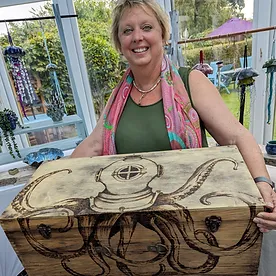
BEACHCOMBING
I acquire reclaimed wood offcuts for my pyrography art, either from the Wood Recycling Project charity, from local carpenters and tradesmen plus I sand down ‘finds’ from junk shops.
On my coastal walks I collect pieces of driftwood which have been beautifully pounded by the sea. Every piece has a story to tell.
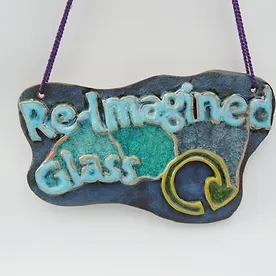
ENDURING
I re-imagine glass too. I have a collection of takeaway tubs which are full of different colours of smashed bottles (mainly gin and wine) that are all repurposed and reused in decorative pieces of work. These make some of the most unexpectedly beautiful successes.
Several customers have given me bottles which have meaning or are sentimental to them, and I have incorporated their glass into commissions.
Pottery never fades. It reduces the need for disposable plastics and the manufacturing process is less harmful to the environment than other production processes. It won’t go mildewy or damp, it won’t get nibbled by little beasties and won’t go brittle with age. It will outlast you and me! It’s a great medium to invest in as well as being totally beautiful.
“Buy Less, Choose Well and Make It Last!” – Vivienne Westwood
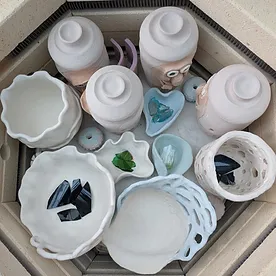
FIRING
The kiln I use is electric, not gas, and super insulated with fire bricks which means that very little heat is lost plus the thermocouple and controller work together for optimum efficiency. The energy consumption per firing is low by industry standards, even over a firing of up to 72hrs.
When I fire, I always ensure my kiln shelves are as full as possible. This may mean a short wait for your order while I fill the shelves with other work but ensures I am using as much of the energy as possible. Even small shelf gaps are filled by making mini dishes or decorations, necklace pendants, small experiments and test tiles.
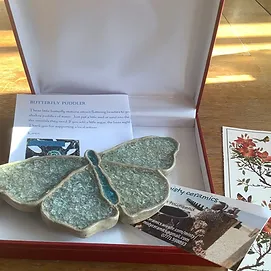
PACKAGING
Orders are packed up using re-purposed packaging. I save and re-use all the wrapping my materials are supplied in. This ensures your ceramic art will arrive with you in the best condition as well as reusing these resources. Plus it keeps my costs down, a saving which I can pass on.
My display stands and shelves were made by my husband from old copper piping and reclaimed beach groins. He even left the gribble holes and some seaweed attached to remind me of their past lives.
I store my clay in discarded paint tubs, and my glaze (non-toxic varieties, of course) in second-hand kilner jars or jams jars. My family collect old newspapers for me because I use them to cover my (second-hand) worktop table. In fact, all the furniture in my studio has been sourced from second-hand shops, marketplace sites or rescued from skips!








